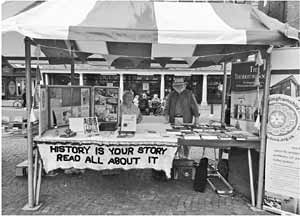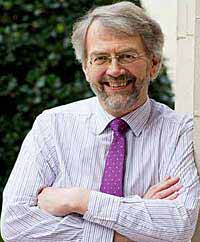News
NEWS FROM THE CHAIR
I am delighted to introduce the first of the Society’s new-style newsletters and hope that members will welcome this change of format. It brings it into line with our existing template for the Annual Report and offers additional economies in terms of production. I would like to thank the newsletter editor, Paul Baker, and his assistant editor, Hannah Nicholson, for all their hard work in putting together another interesting issue.
Members will be pleased to see Barbara Cast’s appreciation of our much-missed former President, Rosalys Coope. This is the centenary year of her birth and her legacy continues to be felt by all in the Society. Within the past few months, the Society has been honoured with a £1,000 bequest from Rosalys’ estate, for which we are deeply grateful. We were also delighted that Geoffrey Bond has offered to continue his generous support of the Society’s Research Award for another year. Geoffrey is a much-valued member of the Society, and we send him warmest congratulations on the award of the prestigious International Elma Dangerfield literary prize, awarded by the International Byron Societies, for his recent book Dangerous to Show (reviewed by John Beckett in the last newsletter).
Nearly 100 people attended John Beckett’s online Cust Lecture on 26 June. A recording of the event is being prepared for the web and a printed version of the lecture will be published by the Society, thanks to generous support from the University of Nottingham’s Cust lecture Fund. More details to follow!
 Judith and Rob at the joint FONA-Thoroton Stall
Judith and Rob at the joint FONA-Thoroton StallAs chair of council, I was pleased to attend the Newark book festival on 11 July 2021 where I found council members Judith Mills and Rob James on the joint FONA-Thoroton stall. It was a welcome return to live events and I hope is the signal for better times ahead.
Wishing that you all have had a healthy summer and have a happy and healthy autumn..
Richard A. Gaunt
ANNUAL LUNCH, SATURDAY 6th NOVEMBER
This year, following the postponement of last year’s Annual Lunch due to COVID restrictions, we will be holding it in the Welbeck Banqueting Suite at the Masonic Hall, West Bridgford. The postcode is NG2 7QW.The date is Saturday 6th November and the time is 1.00pm - you are asked to arrive by 12.30pm. The lunch will cost £22 per person for a three course meal, including a traditional main course plus a vegetarian option and tea and coffee. A variety of drinks will be available from the bar. We are using our Annual Luncheon, as was planned for the postponed luncheon last year, to celebrate the services to the Thoroton Society of Professor John Beckett and Mrs Barbara Cast, both of whom retired from their respective roles in 2020.
John Hess (formerly political editor of BBC East Midlands and a Thoroton Society Member) will be our Master of Ceremonies.
The lunch will also celebrate the publication of Church, Land and People. Essays presented in 2020 to John Beckett volume 950, Record Series).
IMPORTANT NOTE - At the time of writing, July 2021, Welbeck Hall has advised us that they are able to accommodate our event under the relaxations given on the 19th July.
If restrictions are re-imposed and numbers have to be restricted, we will operate a first-come-first-served,members only system.
David Hoskins. Chair, Events sub-committee.
THE CUST LECTURE

John Beckett
The Cust lecture is an annual or bi-annual lecture of the University of Nottingham. It was founded to commemorate the life and work of Henry (Harry) Cust, scion of the Brownlow family of Belton House, Lincolnshire. Cust died in 1917. The first Cust lecture was delivered in February 1921 and it has been given every year or two since then. Initially the lectures were given primarily on aspects of the history of the British Empire but in recent years it has been given on a broader range of topics, by distinguished historians, among them Eric Hobsbawm and Linda Colley.
It was my privilege to give the Cust Lecture for 2021, although it was originally planned to coincide with my retirement from the University in summer 2020. The impact of Covid19 was such that not only was the lecture postponed for a year, but it had to be given via Zoom! As many readers of this newsletter will be aware, in 2016 I published a history of the University of Nottingham.1 This was a substantial volume, but it still left out more than it was possible to put in. Some of the gaps I have, or am, filling in other ways, such as my research on the Prisoner of War camp at what is now the University’s Sutton Bonington Campus. Another gap was the Cust lecture: what was it, when did it take place, and so forth? Answers to some of these questions were to be found in the Brownlow papers in Lincolnshire Archives, as well as in the University of Nottingham’s Department of Manuscripts and Special Collections.
Harry Cust is not known ever to have visited Nottingham University College (as it was until 1948), so why was the lecture founded? What I discovered was that as a contribution to the First World War, Harry Cust had set up the Central Committee for National Patriotic Organisations, designed to co-ordinate the work of numerous organisations formed at or shortly after the outbreak of the First World War in 1914. Most English counties had a branch of the CCNPO and the President and Chairman of the Nottinghamshire branch were the Duke of Portland and W Heaton Haslam. They were also respectively the President and Principal of University College. A small surplus on the CCNPO’s local accounts was, at Haslam’s suggestion, transferred to the University College and used to provide a fee, and to pay the travel expenses of the lecturer. The first Cust lecture was given on 21 February 1921 by Lieutenant-Colonel Leo (L.S) Amery, M.P., Under Secretary of State for the Colonies. After the lecture dinner was served in the College building on Shakespeare Street, before the lecturer was whisked off to Nottingham Victoria Station to catch the train back to London.
Leo Amery was followed by many other distinguished speakers. In its early days after the First World War they included Sir Daniel Hall on ‘The Food of the Empire’, and in 1934 Sir Josiah Stamp on ‘Central Banking as an Imperial Factor’. The first historian to give the Cust lecture was Professor E.H. Carr in 1937 on ‘Great Britain as a Mediterranean Power’.The early lectures were all published (until 1970), and copies distributed both locally and further afield. As funding for the lecture was never over generous, and as one or two potential speakers turned down the opportunity to give it, Harry Cust’s widow Nina supplemented the capital fund on a couple of occasions. By the 1980s she had passed away and the lecture could be given only when funds had been accumulated over several years. Fortunately, the 2021 lecturer required neither a fee nor expenses!
1. John Beckett, Nottingham: A history of Britain's global university (Boydell and Brewer, 2016). Available through the University of Nottingham Online Store: search under 'Nottingham'
John Becket
The Society is publishing the 2021 Cust Lecture, both online and in print. Further information will be available in the e-newsletter and the Winter newsletter.
GEOFFREY BOND AND THOROTON RESEARCH AWARDS: A THANK YOU FROM SCOTT LOMAX
Thank you to Mr Geoffrey Bond, and the Thoroton Society, for providing the funding which has helped my research. Radiocarbon dating of material recovered from an archaeological excavation in the heart of Nottingham city centre, has been made possible by a grant from the Geoffrey Bond Research Award and the Thoroton Society. The dating makes a significant contribution towards research for my PhD, by furthering the understanding of industry during the late medieval period.
My PhD examines the economic conditions of Nottingham during the period 1300 to 1540 using both archaeological and historical documentary evidence. Key research themes include: understanding changing land use within the town, including considering growth and intensification in different areas, as well as contraction of urban space; the growth and decline of trades and industries and the movement of zones of activity; the urban environment and sanitation.
The example of Nottingham is placed within the wider, national context to contribute towards a better understanding of late medieval towns. To address some of the research themes 10 samples were submitted to the Oxford Radiocarbon Accelerator Unit last year, with two samples funded by this grant. The COVID19 pandemic caused delays, but the results have recently been provided. The samples for which the grant was funded were taken from industrial waste (specifically horn cores) found in a series of pits, and the results have indicated a late medieval date for the material.
The results contribute towards a greater understanding of the use of land in one area of Nottingham, and provide details of an industry which is mentioned only once in Nottingham’s surviving medieval records. A paper detailing the results, and their significance, has been submitted for consideration in the next Transactions.
Scott Lomax (PhD Archaeology, University of Nottingham)